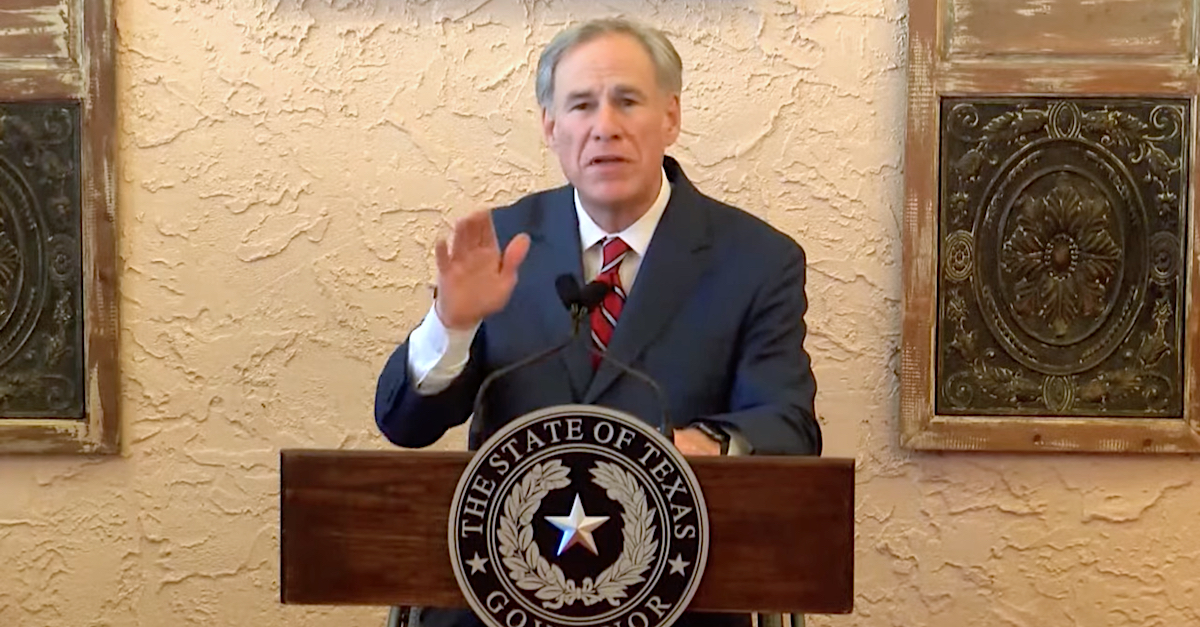
Texas Governor Greg Abbott (R) on Friday announced he was backing a new bill that would make it illegal for private social media companies such as Twitter and Facebook to censor Texans based on their point of view. Abbott’s announcement was met with widespread condemnation by legal experts who immediately pointed out that Senate Bill 12 (SB12) was not only blatantly unconstitutional but also clearly preempted by federal law.
Abbott said the measure would prohibit online platforms from “censoring viewpoints” because “too many social media sites silence conservative speech and ideas and trample free speech.”
“It’s un-American, Un-Texan, and soon to be illegal,” he added.
The GOP has tried to turn up the heat on internet companies since Twitter and Facebook both permanently banned former President Donald Trump for spreading false claims about the 2020 election that contributed to the Jan. 6 attack on the U.S. Capitol.
The legislation is essentially a more robust version of one put forward last month by Florida’s Republican Governor Ron DeSantis. While the Florida proposal only seeks to penalize social media companies that de-platformed a potential candidate for elected office, the Texas law could theoretically be enforced against a platform that suspends or deactivates the account of any Texan or the account of any user a person in Texas wants to hear from.
Under SB12, online platforms “may not censor a user, a user’s expression, or a user’s ability to receive the expression of another person based on: (1) the viewpoint of the user or another person; (2) the viewpoint represented in the user’s expression or another person’s expression; or (3) a user’s geographic location in this state or any part of this state.”
Abbott publicly declared his support for the bill during a Friday press conference with State Rep. Bryan Hughes (R), who said SB 12 was designed to “protect Texas’ free speech and get them back online.” He also claimed social media companies were “common carriers,” much like telephone companies, saying “they cannot discriminate against people” because it is “a violation of the First Amendment.”
Unfortunately, Abbott and Hughes’ bill is an attempt at having government dictate the speech of private companies, which violates the First Amendment. Multiple attorneys and law professors jumped at the opportunity to correct Abbott.
“You are so dumb you don’t understand the difference between government censorship and private speech decisions,” wrote Georgia State University law professor Eric Segall. “One violates the 1st amendment and one is protected by the 1st amendment. Your bill flips the two. Dumb and unconstitutional and I think very little is unconstitutional.”
Sam Brunson, the Georgia Reithal Professor Law at Loyola University Chicago, said it was “yet another Republican announces that he really doesn’t give a damn about little things like, say, the First Amendment to the Constitution.”
Dean of Missouri School of Law Lyrissa Lidsky, who specializes in First Amendment issues, had a similar take.
“As a general proposition, the Government does not get to set itself up as the arbiter of Truth; nor does the First Amendment permit the government to tell private companies what to publish or refrain from publishing on their own property,” she wrote.
https://twitter.com/LidskyLidsky/status/1367901875282931717?s=20
Attorney and legal commentator Max Kennerly additionally noted that any legal challenge likely wouldn’t even get to the constitutional problems with the law because such a case would be dismissed based on preemption.
“Before even reaching the free speech issue, a lawsuit filed under the FL or TX social media bills would be dismissed as preempted by Section 230 of the CDA,” he wrote. “And if it did reach free speech, it’d lose; social media companies can choose what content they allow.”
There were many other similarly straightforward responses on the issue.
Clearly unconstitutional under existing Supreme Court precedent.
— Renato Mariotti (@renato_mariotti) March 5, 2021
— Justin Amash (@justinamash) March 5, 2021
— NeanderthalHat (@Popehat) March 5, 2021
[image via WFAA-TV/YouTube]